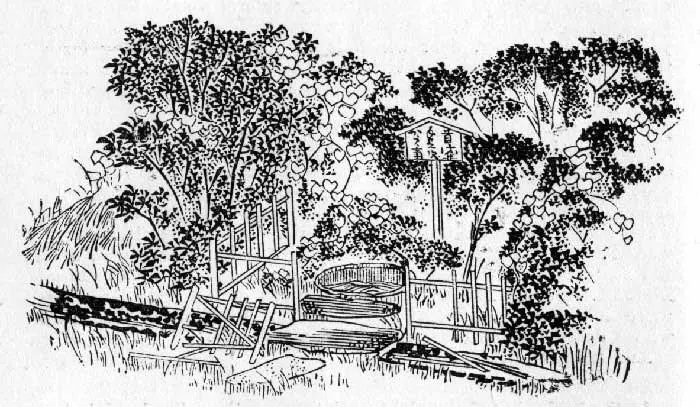Algernon Bertram Freeman-Mitford Redesdale - Tales of Old Japan
Здесь есть возможность читать онлайн «Algernon Bertram Freeman-Mitford Redesdale - Tales of Old Japan» — ознакомительный отрывок электронной книги совершенно бесплатно, а после прочтения отрывка купить полную версию. В некоторых случаях можно слушать аудио, скачать через торрент в формате fb2 и присутствует краткое содержание. Жанр: Сказка, Старинная литература, foreign_antique, foreign_prose, на английском языке. Описание произведения, (предисловие) а так же отзывы посетителей доступны на портале библиотеки ЛибКат.
- Название:Tales of Old Japan
- Автор:
- Жанр:
- Год:неизвестен
- ISBN:нет данных
- Рейтинг книги:4 / 5. Голосов: 1
-
Избранное:Добавить в избранное
- Отзывы:
-
Ваша оценка:
- 80
- 1
- 2
- 3
- 4
- 5
Tales of Old Japan: краткое содержание, описание и аннотация
Предлагаем к чтению аннотацию, описание, краткое содержание или предисловие (зависит от того, что написал сам автор книги «Tales of Old Japan»). Если вы не нашли необходимую информацию о книге — напишите в комментариях, мы постараемся отыскать её.
Tales of Old Japan — читать онлайн ознакомительный отрывок
Ниже представлен текст книги, разбитый по страницам. Система сохранения места последней прочитанной страницы, позволяет с удобством читать онлайн бесплатно книгу «Tales of Old Japan», без необходимости каждый раз заново искать на чём Вы остановились. Поставьте закладку, и сможете в любой момент перейти на страницу, на которой закончили чтение.
Интервал:
Закладка:
In the midst of a nest of venerable trees in Takanawa, a suburb of Yedo, is hidden Sengakuji, or the Spring-hill Temple, renowned throughout the length and breadth of the land for its cemetery, which contains the graves of the Forty-seven. Rônins, 2 2 The word Rônin means, literally, a "wave-man"; one who is tossed about hither and thither, as a wave of the sea. It is used to designate persons of gentle blood, entitled to bear arms, who, having become separated from their feudal lords by their own act, or by dismissal, or by fate, wander about the country in the capacity of somewhat disreputable knights-errant, without ostensible means of living, in some cases offering themselves for hire to new masters, in others supporting themselves by pillage; or who, falling a grade in the social scale, go into trade, and become simple wardsmen. Sometimes it happens that for political reasons a man will become Rônin, in order that his lord may not be implicated in some deed of blood in which he is about to engage. Sometimes, also, men become Rônins, and leave their native place for a while, until some scrape in which they have become entangled shall have blown over; after which they return to their former allegiance. Nowadays it is not unusual for men to become Rônins for a time, and engage themselves in the service of foreigners at the open ports, even in menial capacities, in the hope that they may pick up something of the language and lore of Western folks. I know instances of men of considerable position who have adopted this course in their zeal for education.
famous in Japanese history, heroes of Japanese drama, the tale of whose deeds I am about to transcribe.
On the left-hand side of the main court of the temple is a chapel, in which, surmounted by a gilt figure of Kwanyin, the goddess of mercy, are enshrined the images of the forty-seven men, and of the master whom they loved so well. The statues are carved in wood, the faces coloured, and the dresses richly lacquered; as works of art they have great merit—the action of the heroes, each armed with his favourite weapon, being wonderfully life-like and spirited. Some are venerable men, with thin, grey hair (one is seventy-seven years old); others are mere boys of sixteen. Close by the chapel, at the side of a path leading up the hill, is a little well of pure water, fenced in and adorned with a tiny fernery, over which is an inscription, setting forth that "This is the well in which the head was washed; you must not wash your hands or your feet here." A little further on is a stall, at which a poor old man earns a pittance by selling books, pictures, and medals, commemorating the loyalty of the Forty-seven; and higher up yet, shaded by a grove of stately trees, is a neat inclosure, kept up, as a signboard announces, by voluntary contributions, round which are ranged forty-eight little tombstones, each decked with evergreens, each with its tribute of water and incense for the comfort of the departed spirit. There were forty-seven Rônins; there are forty-eight tombstones, and the story of the forty-eighth is truly characteristic of Japanese ideas of honour. Almost touching the rail of the graveyard is a more imposing monument under which lies buried the lord, whose death his followers piously avenged.
And now for the story.
At the beginning of the eighteenth century there lived a daimio, called Asano Takumi no Kami, the Lord of the castle of Akô, in the province of Harima. Now it happened that an Imperial ambassador from the Court of the Mikado having been sent to the Shogun 3 3 The full title of the Tycoon was Sei-i-tai-Shogun, "Barbarian-repressing Commander-in-chief." The style Tai Kun, Great Prince, was borrowed, in order to convey the idea of sovereignty to foreigners, at the time of the conclusion of the Treaties. The envoys sent by the Mikado from Kiôto to communicate to the Shogun the will of his sovereign were received with Imperial honours, and the duty of entertaining them was confided to nobles of rank. The title Sei-i-tai-Shogun was first borne by Minamoto no Yoritomo, in the seventh month of the year A.D. 1192.
at Yedo, Takumi no Kami and another noble called Kamei Sama were appointed to receive and feast the envoy; and a high official, named Kira Kôtsuké no Suké, was named to teach them the proper ceremonies to be observed upon the occasion. The two nobles were accordingly forced to go daily to the castle to listen to the instructions of Kôtsuké no Suké. But this Kôtsuké no Suké was a man greedy of money; and as he deemed that the presents which the two daimios, according to time-honoured custom, had brought him in return for his instruction, were mean and unworthy, he conceived a great hatred against them, and took no pains in teaching them, but on the contrary rather sought to make laughing-stocks of them. Takumi no Kami, restrained by a stern sense of duty, bore his insults with patience; but Kamei Sama, who had less control over his temper, was violently incensed, and determined to kill Kôtsuké no Suké.

THE WELL IN WHICH THE HEAD WAS WASHED.
One night when his duties at the castle were ended, Kamei Sama returned to his own palace, and having summoned his councillors 4 4 Councillor, lit. "elder." The councillors of daimios were of two classes: the Karô , or "elder," an hereditary office, held by cadets of the Prince's family, and the Yônin , or "man of business," who was selected on account of his merits. These "councillors" play no mean part in Japanese history.
to a secret conference, said to them: "Kôtsuké no Suké has insulted Takumi no Kami and myself during our service in attendance on the Imperial envoy. This is against all decency, and I was minded to kill him on the spot; but I bethought me that if I did such a deed within the precincts of the castle, not only would my own life be forfeit, but my family and vassals would be ruined: so I stayed my hand. Still the life of such a wretch is a sorrow to the people, and to-morrow when I go to Court I will slay him: my mind is made up, and I will listen to no remonstrance." And as he spoke his face became livid with rage.
Now one of Kamei Sama's councillors was a man of great judgment, and when he saw from his lord's manner that remonstrance would be useless, he said: "Your lordship's words are law; your servant will make all preparations accordingly; and to-morrow, when your lordship goes to Court, if this Kôtsuké no Suké should again be insolent, let him die the death." And his lord was pleased at this speech, and waited with impatience for the day to break, that he might return to Court and kill his enemy.
But the councillor went home, and was sorely troubled, and thought anxiously about what his prince had said. And as he reflected, it occurred to him that since Kôtsuké no Suké had the reputation of being a miser he would certainly be open to a bribe, and that it was better to pay any sum, no matter how great, than that his lord and his house should be ruined. So he collected all the money he could, and, giving it to his servants to carry, rode off in the night to Kôtsuké no Suké's palace, and said to his retainers: "My master, who is now in attendance upon the Imperial envoy, owes much thanks to my Lord Kôtsuké no Suké, who has been at so great pains to teach him the proper ceremonies to be observed during the reception of the Imperial envoy. This is but a shabby present which he has sent by me, but he hopes that his lordship will condescend to accept it, and commends himself to his lordship's favour." And, with these words, he produced a thousand ounces of silver for Kôtsuké no Suké, and a hundred ounces to be distributed among his retainers.
Читать дальшеИнтервал:
Закладка:
Похожие книги на «Tales of Old Japan»
Представляем Вашему вниманию похожие книги на «Tales of Old Japan» списком для выбора. Мы отобрали схожую по названию и смыслу литературу в надежде предоставить читателям больше вариантов отыскать новые, интересные, ещё непрочитанные произведения.
Обсуждение, отзывы о книге «Tales of Old Japan» и просто собственные мнения читателей. Оставьте ваши комментарии, напишите, что Вы думаете о произведении, его смысле или главных героях. Укажите что конкретно понравилось, а что нет, и почему Вы так считаете.

![Майкл Суэнвик - Tales of Old Earth [A collection of short-stories]](/books/388351/majkl-suenvik-tales-of-old-earth-a-collection-of-short-stories-thumb.webp)










